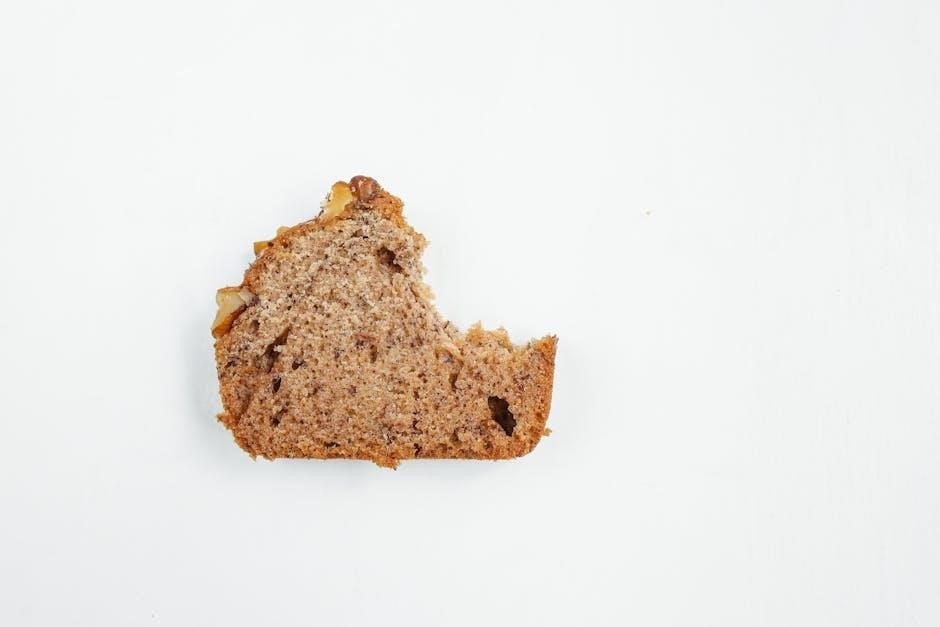Adopting a no-sugar lifestyle reduces added sugars‚ promoting weight loss‚ improved energy‚ and overall well-being. Focus on whole foods to achieve lasting health benefits and a balanced diet.
Understanding the Basics of a No Sugar Diet
A no-sugar diet focuses on eliminating added sugars and reducing natural sugars from your intake. It emphasizes whole‚ unprocessed foods like vegetables‚ lean proteins‚ and healthy fats. By avoiding sugary drinks‚ processed snacks‚ and hidden sugars in foods‚ you can improve your health and energy levels. This approach helps reset your palate and reduces sugar cravings over time‚ promoting a more balanced and nutritious lifestyle.

Benefits of a No Sugar Diet
Reducing sugar intake promotes weight loss‚ improves blood sugar levels‚ and enhances energy. It also lowers the risk of chronic diseases like diabetes and heart conditions.
Weight Loss and Improved Health Markers
Eliminating added sugars helps shed pounds and enhances health markers. By cutting out processed foods and refined carbs‚ you lower blood pressure‚ cholesterol‚ and blood glucose levels. Sustainable weight loss occurs as your body shifts from relying on sugar spikes to burning fat for energy. This dietary change also improves insulin sensitivity‚ reducing the risk of type 2 diabetes and promoting overall metabolic health.
Enhanced Energy Levels and Mental Clarity
Ditching added sugars stabilizes blood glucose levels‚ preventing energy crashes and brain fog. By avoiding sugar spikes‚ you experience steady energy and improved focus. A no-sugar diet also enhances mental clarity‚ as your brain no longer relies on quick sugar fixes‚ leading to sharper concentration and better overall cognitive function. This dietary shift supports long-term energy and mental well-being.
Reduced Risk of Chronic Diseases
Eliminating added sugars lowers the risk of chronic diseases like type 2 diabetes‚ heart disease‚ and fatty liver. By reducing sugar intake‚ you stabilize blood glucose levels and improve insulin sensitivity. This dietary change also contributes to healthier cholesterol levels and blood pressure‚ further protecting against cardiovascular issues. A no-sugar diet is a proactive step toward preventing long-term health complications and promoting overall wellness.
7-Day No Sugar Meal Plan
This structured meal plan offers a week’s worth of balanced‚ sugar-free options‚ ensuring variety and nutrition while helping you stay on track with your dietary goals.
Breakfast Options: Scrambled Eggs with Spinach and Avocado
A nutritious start to your day‚ scrambled eggs with spinach and avocado provide essential protein‚ healthy fats‚ and fiber. Simply scramble eggs with fresh spinach‚ season with salt and pepper‚ and serve alongside sliced avocado. This breakfast is low in carbs‚ free from added sugars‚ and keeps you energized throughout the morning. Perfect for a no-sugar diet‚ it’s both delicious and satisfying.
Lunch Ideas: Grilled Chicken Salad with Mixed Greens
A fresh and flavorful option‚ this salad combines grilled chicken breast with mixed greens‚ cucumbers‚ cherry tomatoes‚ and avocado. Drizzle with olive oil and lemon juice for a light‚ sugar-free dressing. Packed with protein‚ fiber‚ and healthy fats‚ it keeps you full and energized. Perfect for a no-sugar diet‚ this meal is both nutritious and delicious‚ avoiding any added sugars while providing essential nutrients.
Dinner Suggestions: Baked Salmon with Steamed Vegetables
Baked salmon is a nutrient-rich dinner option‚ high in omega-3 fatty acids and protein. Pair it with steamed vegetables like broccoli‚ cauliflower‚ or Brussels sprouts for a balanced meal. Season with olive oil‚ lemon juice‚ and herbs for flavor without added sugars. This dish supports heart health‚ digestion‚ and weight management‚ aligning perfectly with the no-sugar diet’s goals of whole‚ nutrient-dense foods.
Snack Options: Fresh Fruit and Unsalted Nuts
Fresh fruit and unsalted nuts are ideal snacks for a no-sugar diet. Opt for fruits like berries‚ apples‚ or citrus‚ which are naturally sweet and rich in fiber. Pair them with unsalted nuts like almonds or walnuts for healthy fats and protein. Avoid dried fruit or flavored options‚ as they often contain added sugars. These snacks provide sustained energy and curb cravings without compromising your dietary goals.

Foods to Include in Your No Sugar Diet
Focus on whole‚ nutrient-rich foods like proteins‚ vegetables‚ healthy fats‚ and whole grains. These provide essential nutrients and energy without added sugars‚ supporting overall well-being.
Protein Sources: Eggs‚ Lean Meats‚ and Fish
Eggs‚ lean meats like chicken and turkey‚ and fish are excellent protein sources for a no-sugar diet. They provide essential amino acids and keep you full. Opt for grass-fed meats and wild-caught fish to avoid added sugars and artificial ingredients. Incorporate these into meals to maintain muscle mass and support overall health without compromising on taste or nutrition.
Low-Carb Vegetables: Broccoli‚ Cauliflower‚ and Leafy Greens
Broccoli‚ cauliflower‚ and leafy greens are low in carbs and rich in nutrients‚ making them ideal for a no-sugar diet. They provide fiber‚ vitamins‚ and antioxidants while keeping blood sugar levels stable. These vegetables are versatile and can be prepared in various ways‚ ensuring meals remain flavorful and satisfying without added sugars.
Healthy Fats: Avocado‚ Olive Oil‚ and Nuts
Avocado‚ olive oil‚ and nuts are rich in healthy fats that support heart health and satisfy hunger. They provide essential fatty acids‚ vitamins‚ and minerals without added sugars. Incorporate these into meals to enhance flavor and texture while maintaining a balanced no-sugar diet. These fats also aid in nutrient absorption and support overall well-being‚ making them a crucial part of your dietary plan for sustained energy and health.
Whole Grains: Quinoa‚ Brown Rice‚ and Oats
Whole grains like quinoa‚ brown rice‚ and oats are rich in fiber‚ vitamins‚ and minerals‚ making them excellent choices for a no-sugar diet. They provide sustained energy and support healthy digestion. These grains are naturally low in added sugars and high in nutrients‚ helping to balance blood sugar levels. Incorporate them into meals for a nutritious and filling base that aligns with your no-sugar lifestyle‚ offering versatility and flavor to your dishes.

Foods to Avoid on a No Sugar Diet
Avoid added sugars‚ hidden sugars in processed foods‚ and high-sugar fruits. Check food labels to identify sources of unwanted sugars and opt for natural‚ unprocessed alternatives.
Added Sugars: Candy‚ Cookies‚ and Sweetened Beverages
Avoid candy‚ cookies‚ and sweetened beverages‚ as they contain high amounts of added sugars. These foods cause rapid blood sugar spikes and crashes‚ offering no nutritional value. Opt for natural sweeteners like stevia or monk fruit instead of refined sugars. Reading labels is crucial‚ as even seemingly healthy drinks may contain hidden sugars. Limiting these items helps reduce cravings and supports overall health.
Hidden Sugars: Processed Foods and Flavored Dairy Products
Processed foods and flavored dairy products often contain hidden sugars. These include sauces‚ bread‚ and flavored yogurts. Always check labels for terms like “high-fructose corn syrup” or “dextrose.” Even seemingly healthy options can be high in sugar. Opt for unflavored‚ unsweetened versions and whole foods to avoid these hidden sources. Awareness is key to maintaining a no-sugar diet effectively.
High-Sugar Fruits: Bananas‚ Grapes‚ and Mangoes
High-sugar fruits like bananas‚ grapes‚ and mangoes are rich in natural sugars‚ which can spike blood sugar levels. While they offer nutrients‚ moderation is key on a no-sugar diet. Opt for lower-sugar alternatives like berries or citrus fruits. Portion control is essential to manage sugar intake while still enjoying the benefits of whole fruits in your diet.
Tips for Staying on Track
Plan meals‚ read labels for hidden sugars‚ and stay hydrated. Use natural sweeteners sparingly and prep healthy snacks to avoid cravings and maintain consistency.
Meal Prepping and Planning
Meal prepping and planning are essential for staying organized and committed to your no-sugar diet. Create a weekly schedule‚ grocery list‚ and prepare meals in advance to avoid last-minute decisions. Cook wholesome meals like scrambled eggs‚ grilled chicken‚ and baked salmon‚ and portion them for easy grab-and-go options. Prepping snacks such as fresh fruit and nuts ensures healthy choices throughout the day. This approach saves time‚ reduces temptation‚ and keeps you on track with your goals.
Reading Food Labels for Hidden Sugars
Reading food labels is crucial to identifying hidden sugars in processed foods. Look for terms like “high fructose corn syrup‚” “dextrose‚” and “maltodextrin.” Check the ingredient list and nutrition facts to calculate daily sugar intake. Be aware of flavored dairy products and canned goods‚ which often contain added sugars. Understanding labels helps you make informed choices and stay aligned with your no-sugar diet goals for better health and wellness.
Staying Hydrated with Water and Herbal Teas
Staying hydrated is essential for overall health and supports your no-sugar diet journey. Drink plenty of water throughout the day to reduce sugar cravings and boost metabolism. Herbal teas‚ like peppermint or chamomile‚ offer flavorful alternatives without added sugars. Aim for at least eight glasses of water daily and consider setting reminders to stay on track. Proper hydration aids digestion and helps maintain energy levels while adhering to your diet plan.

Common Challenges and Solutions
Overcoming sugar cravings and social pressures are common hurdles. Plan ahead‚ stay hydrated‚ and stock healthy alternatives to maintain discipline and achieve long-term success.
Dealing with Sugar Cravings
Combat sugar cravings by staying hydrated with water and herbal teas. Opt for healthy snacks like nuts or fresh fruit to satisfy sweet urges naturally. Incorporate protein and fiber-rich foods to stabilize blood sugar levels‚ reducing cravings. Plan meals in advance to avoid impulsive sugar intake. Mindful eating and physical activity can also distract and alleviate cravings effectively.
Managing Social Situations and Temptations
Navigate social gatherings by preparing sugar-free alternatives to share‚ ensuring you have healthy options available. Communicate your dietary choices to hosts to avoid awkwardness. Stay committed to your goals by focusing on the benefits of your no-sugar lifestyle. Practice polite refusal of sugary offerings and opt for water or herbal teas. Surround yourself with supportive individuals who encourage your healthy choices.
Overcoming the Initial Detox Phase
The initial detox phase of a no-sugar diet can cause symptoms like fatigue‚ headaches‚ or cravings. Stay hydrated with water and herbal teas to alleviate discomfort. Eat nutrient-dense meals‚ including protein and healthy fats‚ to stabilize blood sugar levels. Prioritize rest and ensure adequate sleep to support your body’s adjustment. Remember‚ these symptoms are temporary‚ and the long-term benefits of improved health and energy make it worth persevering.
Eliminating added sugars transforms your health‚ offering sustained energy and improved well-being. Stay committed to this lifestyle change for long-term benefits and a healthier future.
Final Thoughts on the No Sugar Diet Plan
Embracing a no-sugar lifestyle offers profound health benefits‚ from improved energy to clearer skin. By focusing on whole‚ nutrient-dense foods‚ you’ll cultivate a healthier relationship with eating. Avoid hidden sugars in processed foods and flavored dairy products‚ while enjoying natural sweetness from fruits and vegetables. Stay committed‚ and over time‚ your body and mind will thrive. Remember‚ small changes today lead to lasting results tomorrow.
Encouragement for Long-Term Success
Staying consistent with a no-sugar diet requires commitment‚ but the rewards are worth it. Celebrate small victories‚ like choosing whole foods over processed ones‚ and remind yourself of the positive changes in energy and overall well-being. Stay informed‚ plan ahead‚ and embrace the journey. Every healthy decision brings you closer to long-term success and a healthier‚ more vibrant life. You’ve got this—commit to your health‚ and it will pay off.
